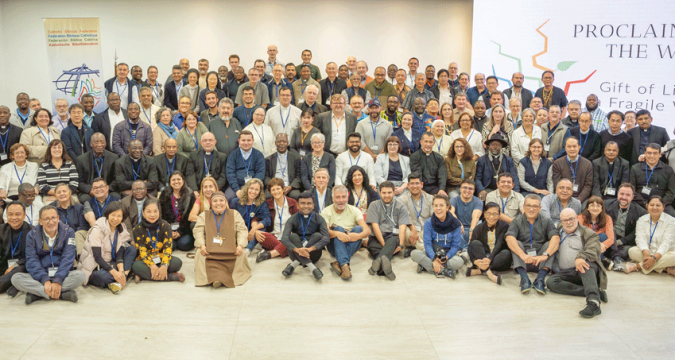
Yvonne Lui, Hong Kong Catholic Biblical Association
The Catholic Biblical Federation [CBF], a global alliance of Biblical Associations of Bishops’ Conferences and Biblical Pastoral organizations, gathered for its 10th Plenary Assembly from April 15 to 21 in Argentina. The deliberations were held on the theme Proclaiming the Word, the Gift of Life for a Fragile World (Romans 8:22-23).
The CBF, headed by Luis Antonio Cardinal Tagle, endeavours to translate the Bible into local languages bringing it alive in the lives of all faithful. The plenary expressed the spirit of the universal Church, in which members listened to each other and, more importantly, to the Word. It also promoted collaboration in serving the Word.
Participants included 14 bishops out of 141 delegates representing 53 countries. Asian delegates included bishops from the Philippines, Thailand, India, and Pakistan along with representatives from South Korea, Indonesia, Vietnam, Mongolia, Taiwan, and Hong Kong.
The delegates from Hong Kong were Claretian Missionary Father Alberto Rossa of the Pastoral Bible Foundation and Yvonne Lui of the Catholic Biblical Association.
Bishop Gabriel Mestre of Mar del Plata, Argentina, presided over the opening Mass. Following the service, the assembly participants marched in procession from the Basilica to the assembly venue, carrying the Holy Bible.
We do not pretend to be stronger than others, but have graduated from every sign of fragility to preach the Word. We cannot be utopic. It might be more profitable mysteriously if we proclaim while we are in existential communion with the world’s fragilities
Cardinal Tagle
Encouraged, the plenary reflected on the theme: Fragilities in the World. When confronted with wounds in the environment and society, the “breath of the Word” blew boldly upon reflection of the vulnerability of the Church.
Bishop Jorge Lozano, the newly elected General Secretary of CELAM [Episcopal Council of Latin America and the Caribbean], pointed out that the Church is fragile precisely because it did not advance where it should have been the “salt and the light” and is moving away from the cries and sighs of the lands and peoples, and vulnerabilities.
Among the first things that Bishop Lozano called for was a change of mindset concerning the formation of seminaries and catechists.
Speaking more on this, Bishop Pablo Virgilio David, president of the Catholic Bishops’ Conference of the Philippines, challenged participants to leave the model of “pastor [who teaches and guides]—flock [who listens and does]” and to return to the ecclesial original model where the pastor is the Lord, in the Word and the Eucharist. All are “missionaries of the Word” attentive to the signs of the times.
Confronted with various fragilities discussed during the plenary, Charles Maung Cardinal Bo, president of the Federation of Asian Bishops’ Conferences, guided the participants in learning how Pope Francis proclaims the Word as a gift of life for this fragile world. He stressed the need for the Church to evangelise itself—to spread the gospel with tenderness, empathy, and compassion and to be able to cry; to come out to the marketplace and meet people and have social encounters with social media as an emerging platform.
…the Church is fragile precisely because it did not advance where it should have been the “salt and the light” and is moving away from the cries and sighs of the lands and peoples, and vulnerabilities
Cardinal Bo echoed Pope Francis in urging evangelising more by example than by words and stressing that the Gospel is God in action.
The CBF plenary closed with considerations on Cardinal Tagle’s profound reflections that the life of the Church has three pillars: The Word of God, the Sacraments, especially the Eucharist, and the service of charity. The cardinal encouraged the participants to reconfigure parishes and dioceses based on these three pillars of ministry. He called on the participants to proclaim the Word as fragile persons; weak Churches accepting the beauty of being fragile.
“We do not pretend to be stronger than others, but have graduated from every sign of fragility to preach the Word. We cannot be utopic. It might be more profitable mysteriously if we proclaim while we are in existential communion with the world’s fragilities,” the cardinal said.
By proclaiming the Word in the midst of a fragile life journey, Jesus illustrates the importance of self-emptying and solidarity with those who are fragile, or even error-prone. The shepherds, are also the sheep that need pasturing. As weak sheep, we proclaim that the source of true power and peace is Jesus.
The cardinal finished saying, “When we, as fragile sheep and the rest of the insecure world, proclaim the Word of Life and Hope; we also expose the false power and strength that destroys humanity and God’s creation. As the beautifully fragile creature of God, as a victim of inhumanity, we could please God by doing justice, loving goodness, and walking humbly with God,” and walking humbly with each other” (Micah 6:8).
The plenary closed with the following statement: “During their time together, the assembly’s delegates experienced a sense of hope and grace, even as they recognised the ever-present shadow of fragility, brokenness, and ‘groaning.’ This shadow was lifted by a profound connection to a larger community of believers, the Church, enlivened by the gift of life from God’s Word. Although we share in the sufferings and existence in a fractured world, we are sustained by an unshakable and sure hope that is grounded in the experience of God’s love [cf. Romans 5:5]. In this fragile yet vibrant landscape of contemporary life, the federation resolves to be God’s instrument, working towards the recreation of the world by the divine plan as laid out in Scripture. Within this hopeful context, the ‘groaning’ that arises from our fragility is transformed into a ‘sighing’ of hope, a yearning for the dawn of God’s new creation that we long for and towards which we strive.”








